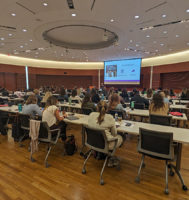Currently Enrolling Participants for:
Healthy Little Eyes Study
Help us understand how the eye function of the babies change over time. For more information or to contact us, please view our study pamphlet.
Dr. Pelin Cengiz’s research focuses on finding a novel therapy for neonatal encephalopathy subsequent to hypoxia ischemia (HI). She uses the experimental (Vannucci-Rice) mouse model of hypoxia ischemia (HI) to study the sexually differentiated role of neurotrophin signaling in the neonatal hippocampus post-HI. The neurotrophin receptor, tyrosine kinase B (TrkB), plays an important role in neuroprotection and improving the long-term functional recovery following cerebral ischemia by increasing neuronal survival. She has shown that administration of 7,8 dihydroxyflavone (7,8-DHF; potent and selective TrkB agonist) increases TrkB phosphorylation and hippocampal neuronal survival following HI in female, but not in male newborn mice. This female-specific responsiveness to TrkB agonist therapy mimics improved outcomes observed clinically in female newborn humans post-HI. Her studies focus on the cellular mechanisms of the female-specific responsiveness to TrkB agonist and their roles in improving long-term neurological and functional outcome post-HI. An improved understanding of the cellular mechanisms that underlie sex-specific neurotrophin responses will identify new avenues for developing novel therapeutics for neonates and children suffering from brain injury.
Study Led By Pelin Cengiz, MD, Examines Why Female Newborns are Better Protected from Brain Injury
As a University of Wisconsin former ICTR KL2 scholar, the Clinical and Translational Research Training was crucial in retooling her lab after her primary research mentor left UW-Madison in 2011. With the support of the KL2 Program, Cengiz was able to expand her mentoring team and continue to move her research project forward without a lapse in productivity.
Dr. Cengiz’s clinical duties include serving as an Attending in the PICU and in the Outpatient Sedation Clinic at American Family Children’s Hospital. Abroad, she is an active member of the international health community.
Additional Research Activities
- Role of estrogen receptors and TrkB signaling in sexed hippocampal astrocytes and neurons after in-vitro ischemia
- TrkB signaling in sex specific hypothermic neuroprotection
- Sex specific protective effects of 7,8 DHF on learning and memory after HI
- TrkB signaling and hypoxia-ischemia induced retinopathy
Research News

Division of Critical Care hosts Pediatric Critical Care Regional Meeting
On May 22, the Division of Critical Care hosted the Pediatric Critical Care Regional Meeting at the Discovery Building on the UW–Madison campus. About 115 people attended the event, which is a collaborative effort of …
July 8, 2024
May is Clinical Trials Month: Department of Pediatrics supports a wide range of clinical research and trials across all specialties
Department of Pediatrics researchers, both MD and PhD scientists, run more than 60 research groups across diverse specialties within the 16 divisions. Of the more than $55 million in research awards the department received in …
May 9, 2024


Pelin Cengiz awarded grant to study sex differences in nerve growth factor treatment for neonate brain injury
Pelin Cengiz, MD, professor, Division of Critical Care, has been awarded a one-year grant from the UW Office of the Vice Chancellor for Research and Graduate Education (OVCRGE) for $62,640. The project is titled “Interneurons …
March 8, 2023- More News...

Professor (CHS)
cengiz@pediatrics.wisc.edu
